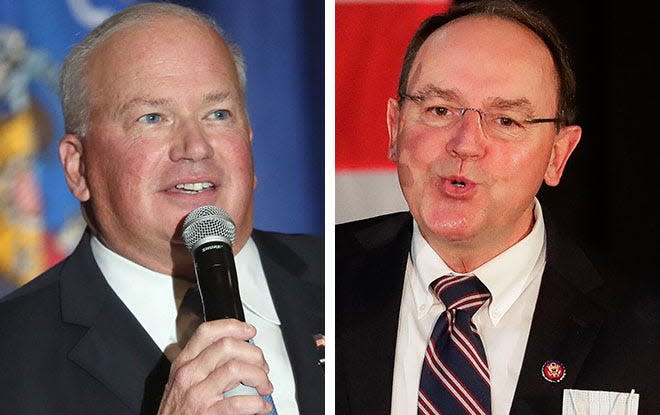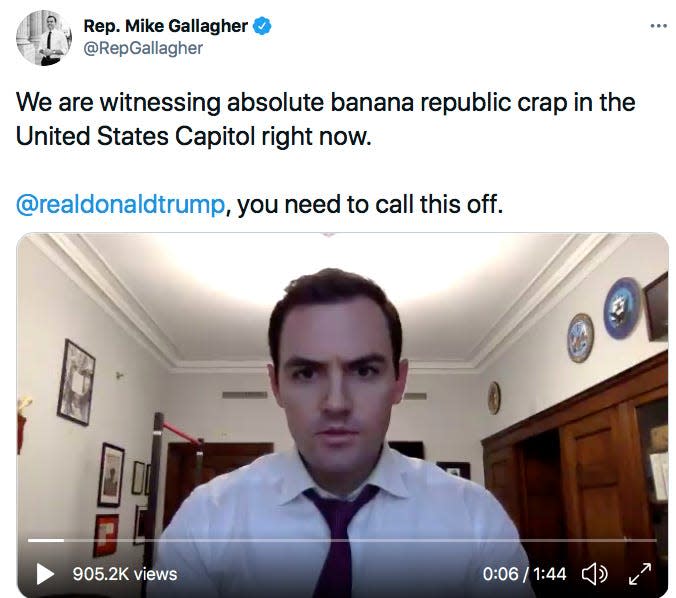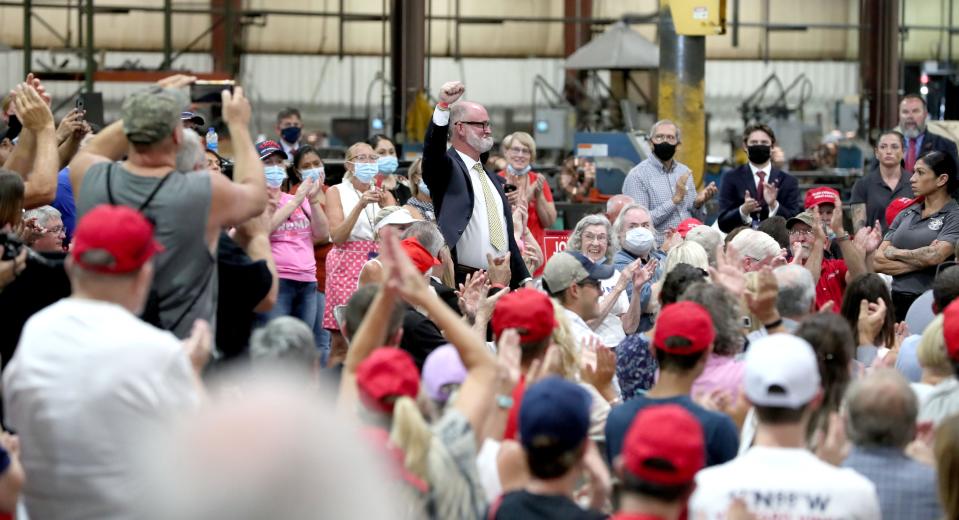The Jan. 6 committee hearings begin Thursday. Here are Wisconsin's connections to the events at the U.S. Capitol building.
- Oops!Something went wrong.Please try again later.
- Oops!Something went wrong.Please try again later.
- Oops!Something went wrong.Please try again later.
WASHINGTON – Congressional leaders on Thursday will begin to publicly present the findings of their investigation into the Jan. 6 attack on the U.S. Capitol, an assault spawned in part from former President Donald Trump’s false claims of election fraud in Wisconsin and other states.
The House Select Committee’s public hearing is the first in a planned series that will detail the 11-month investigation into the insurrection, during which Trump supporters stormed the Capitol, clashed with police and tried to stop the certification of the Electoral College vote.
And while it’s not clear how much, if any, of the findings will touch on Wisconsin, it’s hard to ignore the state’s connection to the unprecedented effort to overturn the election — both before and after Jan. 6.
The Republican review of the 2020 election in the state has cost Wisconsin taxpayers nearly $900,000 and could continue into next year, despite recounts and court rulings reaffirming Joe Biden’s win.
At least eight Wisconsinites have been charged in connection to the insurrection.
Here’s a refresher on what you need to know about Wisconsin before the hearings begin.
The false electors in Wisconsin

Wisconsin was among seven states that Biden won where groups of Republicans gathered as presidential electors in 2020 at the direction of the Trump campaign.
The would-be Wisconsin electors gathered in the State Capitol on Dec. 14, 2020 — at the same time Wisconsin’s Electoral College members met in the same building to deliver the state’s 10 electoral votes to Biden — and purported to file their votes for Trump.
They signed official-looking documents stating Trump had won even though the state Supreme Court had ruled an hour earlier that Biden was the victor. The group also sent the material to the U.S. Senate, the National Archives, Wisconsin Secretary of State Doug La Follette and a federal judge.
Biden beat Trump by about 21,000 votes in Wisconsin.
The Select Committee this past January subpoenaed two of those false electors, former Republican Party of Wisconsin chairman Andrew Hitt and Eighth Congressional District Republican Party chairwoman Kelly Ruh, as part of its probe.
In May, two of Wisconsin’s legitimate presidential electors filed a lawsuit seeking to fine the 10 false electors for hundreds of thousands of dollars in damages to ensure the losing side in future elections doesn't take similar steps claiming to be the winner.
Wisconsin Elections Commissioner Robert Spindell, who posed as one of the so-called electors, has said the group was acting at the directive of the Trump campaign. Members of the group have defended their actions as a legal strategy in the event election results were overturned in a lawsuit.
The state elections commission decided not to sanction the 10 Republicans for their actions. A union group challenged that decision.
Votes against certification of Joe Biden's win over Donald Trump

Reps. Tom Tiffany and Scott Fitzgerald were the only members of Wisconsin's congressional delegation to vote against certifying Biden's victory in Arizona and Pennsylvania when Congress reconvened after certification was disrupted by the insurrection.
Fitzgerald, the delegation's newest congressman, indicated at the time he was more concerned with how the election was conducted during the pandemic than claims of fraudulent voting. Republicans took issue with things like clerks filling in the addresses of witnesses on absentee ballot envelopes and the use of ballot drop boxes in the state.
Fitzgerald also claimed there were “changes made systematically” to how the election was administered “that was absolutely compromised in Wisconsin."
Tiffany, after the votes to overturn the results in Pennsylvania and Arizona, told the Journal Sentinel: “The election improprieties were significant in both of those states. Because of the narrowness of those races, it called into question those elections. So I did choose to vote for them, in particular Pennsylvania. Pennsylvania's system is scrambled right now and they need to get that fixed.”
Other members voted to affirm 2020 presidential election results
Though the two newest members of the delegation voted to overturn election results, Wisconsin Republicans Glenn Grothman, Bryan Steil and Mike Gallagher all voted to affirm Biden’s win.
Grothman in a statement at the time said: “The idea that the President would be determined by a vote of Congress is both absurd and dangerous.”
Gallagher said it was "constitutional nihilism" for Congress to presume to overturn the results.
Ron Kind, Gwen Moore and Mark Pocan, Wisconsin’s three Democratic representatives, all voted against the challenges.
Ron Johnson’s flip-flop on certifying the election
Sen. Ron Johnson prior to the Jan. 6 certification votes indicated he planned to object to the results of the election in some states.
He told the Journal Sentinel that a "large percentage of the population don't view this election as legitimate,” saying, “I'm not going to do what Democrats and many in the media want us to do, which is just shut up, sweep all of this under the rug and move on.”
On Jan. 6, he signed on to an objection to the Arizona results before backing away from that position after a mob of Trump supporters stormed the Capitol, disrupting the certification process.
"I thought the debate in the chamber was very good and solidified in my mind what our constitutional constraints are," Johnson told the Journal Sentinel in explaining why he voted against the objection.
Months later, Johnson said "by and large it was a peaceful protest except for there were a number of people, basically agitators, that whipped the crowd and breached the Capitol."
Wisconsin Democratic Sen. Tammy Baldwin also voted against the objections.
Mike Gallagher and the impeachment vote

As rioters stormed the Capitol on Jan. 6, Gallagher tweeted a video message calling on Trump to call off the mob as he sheltered in his office.
“This is banana republic crap that we’re watching happen right now,” Gallagher said in the video. “This is the cost of countenancing an effort by Congress to overturn the election and telling thousands of people that there is a legitimate shot of overturning the election today, even though you know that is not true.”
“We have got to stop this,” Gallagher added. “Mr. President, you have got to stop this. You are the only person who can call this off. Call it off. The election is over. Call it off.”
We are witnessing absolute banana republic crap in the United States Capitol right now. @realdonaldtrump, you need to call this off. pic.twitter.com/0QGx2PlXFY
— Rep. Gallagher Press Office (@RepGallagher) January 6, 2021
In a USA Today op-ed published more than a week after the attack, Gallagher described how he and his staff barricaded his office door with furniture as they “devised a plan for how we would defend our position if the rioters came.”
He noted how he took a largely ceremonial sword he bought during his time in the Marines out of its display case. “It seemed like the most practical weapon with which I could defend myself, if it came to that,” he wrote.
Still, when it came time to vote to impeach Trump for "inciting violence against the government of the United States,” Gallagher voted against impeachment. In a blog post explaining his vote, Gallagher noted Trump “bears responsibility for the tragic events of January 6th, 2021” but said impeachment “accomplishes nothing.”
“This is not wise,” Gallagher said of impeachment. “It will not advance the cause of justice. It will not restore our constitutional order. If anything, it will simply feed a cycle of enmity and polarization, which is already spiraling further out of control, chilling speech and silencing debate.”
Party-line split on impeachment
Wisconsin’s other GOP House members joined Gallagher in voting against impeachment.
Grothman on the House floor ahead of the vote claimed Trump “clearly said he wanted peaceful and patriotic demonstration.” He appeared to defend those at the Capitol the day of the insurrection. “What is offensive is what (Democrats) are saying … about the tens of thousands of peaceful protesters who were there last week, as well as the tens of millions of people they represent.”
He added: “You don’t understand why they were here. They’re scared to death we’re going to go back to the days without Donald Trump…”
Fitzgerald called it "ridiculous and irresponsible" to "rush an impeachment through the House of Representatives without the results of an investigation or substantive congressional debate on the issue."
And Tiffany said the impeachment vote is "an effort to rub salt in the wounds of millions of Americans."
In a statement, Steil also indicated the impeachment vote would only stoke more division. "Speaker (Nancy) Pelosi’s sham process included no hearings, no investigation, no witness testimony, and no due process," he said.
Wisconsin's Democratic House members took a different approach.
“It wasn't another country that attacked us but our own president," Pocan said on the House floor. "President Donald Trump asked his supporters to march on the Capitol, inciting domestic terrorism that cost five lives, including a Capitol police officer. And we all know, whether you say it aloud or not, Donald Trump was responsible for inciting the attacks on our democracy when he should have been the one person protecting it the most, and for that he is unfit to be president."
Moore on the House floor said Trump "radicalized American citizens." She added: "As his vice president fled from a lynch mob ... while people died, he watched with glee. That is why, even though it's only seven days before the end of his term, we have the fierce urgency of now."
Kind in a statement called Jan. 6 a "dark day" and blamed Trump for inciting the insurrection.
"It’s critical that everyone involved in this unprecedented assault on our democracy is held accountable, including President Trump," Kind said.
Derrick Van Orden's rally attendance

Derrick Van Orden, the Republican frontrunner to fill Kind's House seat in western Wisconsin, has been criticized for his presence in Washington, D.C., on the day of the insurrection.
Van Orden has maintained he attended the Trump rally that preceded the Capitol attack but left when the riot began. In a Jan. 13, 2021, opinion column published in the La Crosse Tribune, Van Orden wrote that he was in D.C. "for meetings and to stand for the integrity of our electoral system as a citizen and at the behest of my neighbors here in Western Wisconsin."
"Two of my friends, both combat veterans, and I stood on the parapet that lines the perimeter of the grounds and watched what should have been an expression of free speech devolve into one of the most tragic incidents in the history of our nation," Van Orden wrote.
"When it became clear that a protest had become a mob, I left the area as to remain there could be construed as tacitly approving this unlawful conduct. At no time did I enter the grounds, let alone the building."
A June 2021 report from The Daily Beast alleged the GOP candidate was closer to the Capitol on the day of the insurrection than he said — claiming social media posts show Van Orden in a restricted area beyond police barricades.
Van Orden dismissed those claims as “inaccurate.”
Molly Beck, Patrick Marley, Bill Glauber and Craig Gilbert of the Milwaukee Journal Sentinel contributed.
Contact Lawrence Andrea at landrea@jrn.com. Follow him on Twitter @lawrencegandrea.
Our subscribers make this reporting possible. Please consider supporting local journalism by subscribing to the Journal Sentinel at jsonline.com/deal.
DOWNLOAD THE APP: Get the latest news, sports and more
This article originally appeared on Milwaukee Journal Sentinel: Jan. 6 investigation hearing: Wisconsin's role in overturning election

